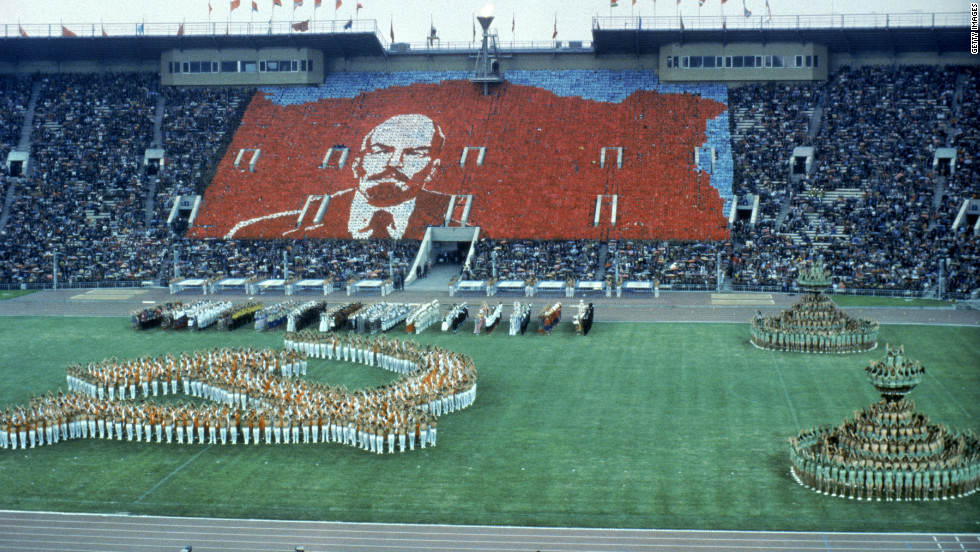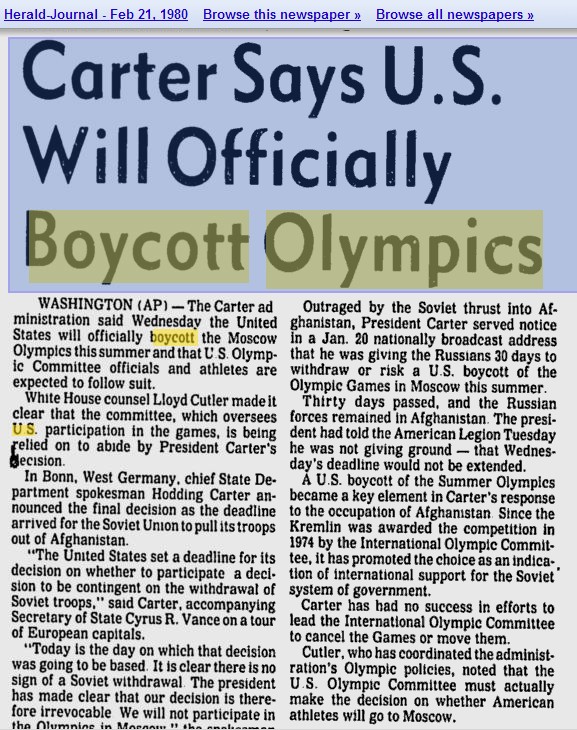
Pictured: A choreographed show producing a hammer and sickle and the face of Lenin at the Opening Ceremony, 1980.
The Olympics have been around since 1896. A spectacle featuring the world’s top athletes, their abilities, and the country’s patriotism. The Olympics have become a major source of entertainment as millions gather around to watch and cheer on their favorite athletes.
The Summer Olympic Games of 1980 was an opportunity to showcase Soviet athletes and achievements in front of the whole world. New construction led to new stadiums, training facilities, and even a new airport. The Soviet Union transformed itself to a country of newly paved roads, freshly painted murals, and blossoming trees. If other countries had doubt about the Soviet Union as a great power, this city renovation destroyed those doubts.
However, despite the Soviet Union’s effort to reinvent their image, the Olympic Games became politicized. “The United States and 55 other nations decided to boycott the games in protest over the Soviet invasion of Afghanistan in December 1979,” (Moscow Olympics). President Jimmy Carter gave the Soviets thirty days to withdraw from Afghanistan or risk a boycott of the Olympics. Thirty days passed and the Soviets remained in Afghanistan. President Carter stated, “Above all, the decision you will make today is not a choice between a sports issue and a national security issue; for the President and Congress have made it clear that the Olympic boycott is a genuine element of America’s response to the invasion of Afghanistan… It is a keystone in our call to our allies for solidarity… And thus it is also a referendum on America’s character and fundamental values,” (US Olympic Committee).

Pictured: A newspaper from the Herald-Journal from February 21, 1980 demonstrating the boycotting of the Olympics.
The Soviet Union ended up counter-boycotting the Summer Olympics in Los Angeles, four years later in 1988.
A great 2 minute summary: https://www.youtube.com/watch?v=jL_8vpos-Fk
Sources:
Moscow Olympics: http://soviethistory.msu.edu/1980-2/moscow-olympics/
US Olympic Committee: https://www.wilsoncenter.org/blog-post/the-1980-moscow-olympics-boycott
I have always found it to be so interesting that the Olympics can be used as a political bargaining chip of sorts. Thanks for sharing this example of it’s politicization!
LikeLiked by 1 person
Agreed! Politicization is seen everywhere today, even on things one would not think is political.
LikeLike
Good post! As Catherine said above, I also find it interesting that the Olympics are used for political use or gain. We can still see this happening today. If not for gain, the Olympic Games often dominate the media and shape perceptions of foreign states other than one’s own.
LikeLike
Very true! Especially how the Soviet Union counter-boycotted the games in Los Angeles 4 years later.
LikeLike
It is funny that anything can be politicized. You’d think that boycotting the Olympics though almost disappoints their country’s own citizens and athletes more than the state they’re boycotting.
LikeLike
That NBC news flashback is pretty impressive. To me the most interesting aspect of the 1980 boycott is how badly the US miscalculated. Even though many other countries joined the boycott, the Moscow games went on, as did the war in Afghanistan. What did the Current Digest have to say about the boycott? How did the Soviets defend their stance?
LikeLike
Found some articles on it; here are the best ones: https://dlib-eastview-com.ezproxy.lib.vt.edu/search/pub/doc?art=7&id=13625953; https://dlib-eastview-com.ezproxy.lib.vt.edu/search/pub/doc?art=16&id=13625976; https://dlib-eastview-com.ezproxy.lib.vt.edu/search/pub/doc?art=22&id=13626163. In summary, the Soviet Union released statements saying the boycott will not affect them, nor will it stop the games from happening. “But ill-wishers of our Olympics have also appeared. It is perfectly clear that they are concerned only with their own narrowly political aims and not at all with the interests of the Olympic movement and of the world’s young people, who want to meet each other at the Games and develop mutual understanding.” They call the United States and its allies for having ill intentions during the Olympics, saying the Olympics should not be politicized and the focus should be on the athletes.
LikeLike
Soviets stood strong and defended their athletes and the Olympics being in their country. Soviet fans flocked to even the most obscure events, filling venues to near capacity. It is said 3.9 million out of 5.2 million tickets were purchased by Soviet citizens.
LikeLike
Very cool post. I think it is very interesting how the Soviet Union went out and beautified parts of their country to impress the visiting countries. I know most countries go out of there way to ensure visiting people are impressed by the show put on during the Olympics. The first thing I thought about when I saw your blog post title was the Russian Olympics in Sochi and how there were issues with stray dogs and the horrible things they were doing to them. It seems ironic how much work the Russians have to do to put on a show to the rest of the world.
LikeLiked by 1 person
I enjoyed this post and the stats you added in a comment. No matter if the US, and 55 other states boycotted the Olympics, the Russian people would still have pride in their country and try to witness the events. I think its karma how Russia didn’t partake in 1984 Olympic Games.
LikeLiked by 1 person
I like to contrast this to the past Olympics where North and South Korea marched under the same flag. That Olympics was politicized to bring nations together and not express disapproval or condemnation. I also find it funny that the Soviets used the rhetoric that the Olympics are a time of peace and later held their own counter-protest of the Olympics. Great post!
LikeLiked by 1 person
The images that you chose are very interesting and appear to represent your post pretty well. How did the citizens react to the boycott? I assume they would be relatively disapointed from this.
LikeLike